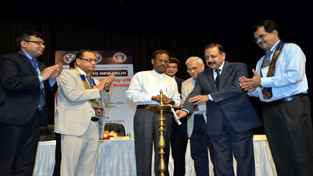
Excelsior Correspondent
NEW DELHI, Mar 27: Citing the Prime Minister Narendra Modi’s reference to Diabetes as the theme of this year’s World Health Day during his “Mann Ki Baat” radio broadcast this morning, Union Minister of State (Independent Charge) for Development of North Eastern Region (DoNER), MoS PMO, Personnel, Public Grievances, Pensions, Atomic Energy and Space, Dr Jitendra Singh has said that this reflects the Government of India’s serious concern for controlling the rapidly spreading epidemic of Diabetes in this country. Prime Minister’s reference is not only a matter of encouragement for the entire Diabetes fraternity but also entrusts the responsibility upon us to live up to the task of prevention and control of Diabetes as well as other Non-Communicable diseases, which is the major challenge for 21st century India, he added.
Speaking as chief guest at the inaugural session of International Workshop on Kidney Transplant here today, Dr Jitendra Singh also lauded the Government’s decision to set up kidney dialysis units across the country, particularly in the light of the fact that Diabetes is the major cause of end-stage kidney disease in India. He also thanked the Union Finance Minister, Arun Jaitley for having announced in Budget the setting up of such units which would be a great relief to thousands of patients across the country who require dialysis but are unable to afford it.
Dr Jitendra Singh said, with the passage of time, the disease spectrum in India has changed and has shifted from communicable to non-communicable diseases. Therefore, he said, the medical strategies of management also need to be changed and have to be primarily oriented to the preventive aspect.
With the increase in lifespan and change in lifestyle, Dr Jitendra Singh said, cancer, heart disease and diabetes are on the rise, but a greater challenge is on account of the fact that diseases like diabetes and heart attack, which earlier mostly afflicted the middle age and elder age groups, are now also affecting the youngsters in a big way. For a country like India, with over 65 per cent of population below the age of 35 years, if we have to emerge as a world power in the coming years, it is essential for us to ensure that the health of the youth in this country is not adversely affected, for which prevention is the basic Mantra.
Director General Health Services Dr Jagdish Prasad, Director AIIMS Dr M C Mishra and renowed urologist Dr Rajiv Sood were among the other prominent medical professionals who spoke on the occasion.

